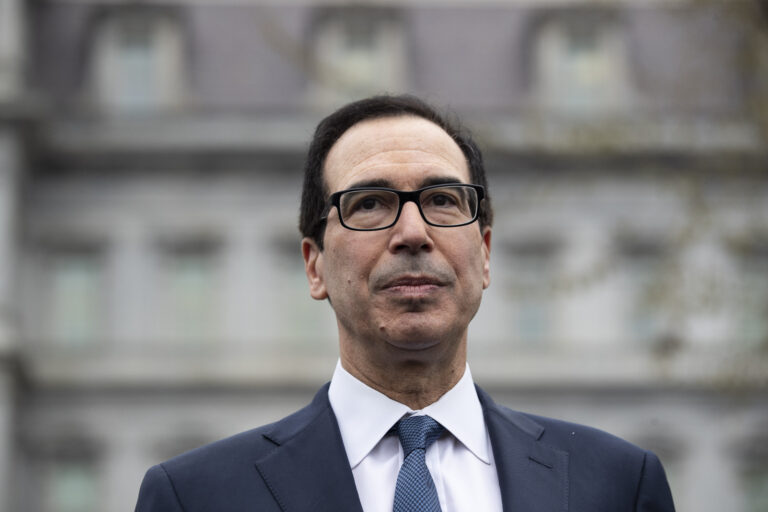It seems like a bizarre mishmash: A former Trump cabinet official is saying he wants to buy TikTok just days after leading a group that pumped $1 billion into a beaten-down bank. But it all actually fits in with the complicated career of Steven Mnuchin.
The man who served as former President Donald Trump’s Treasury secretary is well connected in the world of finance, after all. From 1985 to 2002, he worked at Goldman Sachs, one of the most storied — and criticized — investment banks on Wall Street.
Mnuchin also has a history in media and entertainment. Among his Hollywood credits are “Mad Max: Fury Road” and “The Lego Movie,” where he was one of the executive producers. Think of them as much bigger-budget versions of TikTok videos.
And Mnuchin certainly has experience taking risks with troubled institutions. He famously swooped in to turn around the struggling IndyMac bank after its failure in the financial crisis of 2008.
But for critics, Mnuchin’s dealmaking also raises concerns about ethics. Robert Weissman, president of the watchdog group Public Citizen, points to TikTok in particular, where the U.S. government may force its Chinese owners to sell. Imagine something similar happening in another country, where its former finance minister ended up as the buyer, he said.
“When you’re at the top of the financial policymaking hierarchy, you don’t jump from that to figure out how you can help yourself,” Weissman said.
Other former Treasury secretaries have gone to Wall Street after their terms ended, including Robert Rubin, a Goldman Sachs executive who served under President Clinton. In all cases, the move carries the appearance of cashing in on their time in government, Weissman said.
Mnuchin, who couldn’t be reached for comment through a request via his private-equity firm, has often generated controversy as he has generated cash.
After leaving the Treasury Department in January 2021, he launched his private-equity fund, Liberty Strategic Capital, which raised $2.5 billion by that September, according to news reports.
Much of that money was from government-controlled investment funds in Saudi Arabia and other Persian Gulf states, which Mnuchin had frequently visited as Treasury secretary. He was in the Middle East just weeks before leaving office, cutting the trip short after the Jan. 6 Capitol riot.
The rapid shift from his government travel overseas to business dealings in those same countries prompted a watchdog group, Citizens for Responsibility and Ethics in Washington, to call for a one-year ban on senior government officials doing business overseas after leaving office.
Earlier this month, Mnuchin jumped back into the headlines when his PE firm led a roughly $1 billion investment in embattled New York Community Bancorp.
NYCB was looking for a lifeline, and its stock had at one point plunged more than 80% from the start of the year. The bank is struggling with falling values for investments tied to commercial real estate and the growing pains associated with some of its past acquisitions.
It all hearkens back to the move that may have defined Mnuchin’s career.
In 2009, OneWest Bank Group, where Mnuchin was chairman and CEO, bought the troubled IndyMac after federal regulators took over the bank. Other big-name backers included funds tied to George Soros and hedge-fund manager John Paulson.
OneWest bought all of IndyMac’s deposits and assets at a discount of $4.7 billion following an auction by the Federal Deposit of Insurance Corp. The FDIC also agreed to share in the losses created by some mortgages tied to single-family homes.
Kevin Kaiser, an adjunct professor of finance at the Wharton School, said such investors can profit by buying at steep discounts when markets are panicking. To ensure the investment pays off, however, investors like Mnuchin have to pay hardball with borrowers at risk of default, he said.
“They’re a little bit sharp elbowed,” Kaiser said, referring to distressed-property investors as a group. “And what that means is they’re not shy to get into a bit of a conflict situation.”
After OneWest, Mnuchin was Trump’s top fundraiser in the 2016 election. He came under fire in Congress when he was nominated for the Treasury post, after it came out that OneWest foreclosed on tens of thousands of homes after the U.S. housing bubble popped.
Advocates found the bank particularly difficult to work with under government mortgage modification programs. Some of those who lost their homes had voted for Trump in 2016 and were disappointed in Mnuchin’s nomination.
Maxine Waters, the top Democrat of the House’s financial committee, at the time called Mnuchin the “foreclosure king.”
In testimony before a Senate committee considering his nomination, Mnuchin said he had worked to help homeowners remain in their homes and that his company had extended more than 100,000 loan modifications to borrowers.
Mnuchin was Treasury secretary in 2020, when the Trump administration brokered a deal where Oracle and Walmart would take a large stake in TikTok. That deal eventually fizzled for several reasons, but the popular video app is again under pressure after the House of Representatives passed a bill Wednesday to ban it in the U.S. if its China-based owner doesn’t sell its stake.
On Thursday, Mnuchin said in an interview with CNBC that he had spoken with “a bunch of people” about creating an investor group to buy TikTok.
And Mnuchin may not be done.
Mnuchin has plenty of potential, distressed targets given the banking industry’s troubles, said Chris Caulfield, who runs the banking practice at West Monroe, a consulting firm.
Besides having a history of bringing in new leadership teams to right struggling banks, Mnuchin also has experience in the potentially thorny world of regulations.
“He also has access to capital,” Caulfield said of Mnuchin. “Should there be need for more capital, he’s somebody who’s very adept at putting consortiums together.”
(AP)












One Response
Both business have run into problems which will cause the price of the stock to be depressed, but appear to be sound companies that can prosper under good management which will cause the stock price to go up. Regardless of what AP or YWN things, buying low and settling high is a well respected business practice that when done correctly is very profitable.